

Officials from the National Highway Traffic Safety Administration (NHTSA) quietly issued Tesla a cease and desist notice to immediately discontinue issuing false safety claims regarding its electric Model 3 sedan.
News of the letter became public on Tuesday evening after a non-profit legal resource, PlainSite, published a 79-page document with information it had received from filing a Freedom of Information Act request to the NHTSA. According to PlainSite, an additional 450 pages were withheld at Tesla’s request for confidentiality.
The letter, dated Oct. 17, 2018, outlines the federal agency’s position that Tesla’s statements regarding the Model 3 achieving the “lowest probability of injury of any vehicle ever tested by NHTSA” were misleading to consumers. Further points are made in the letter by quoting several excerpts from a blog post on Tesla’s website (which at the time of writing is still publicly accessible) and a tweet which linked to the post.
According to the NHTSA, the claims made by Tesla were deemed to be inappropriate due to the automaker comparing the ratings of the Model 3 with vehicles that have a weight spread of more than 250 pounds.
“The guidelines warn against comparison statements like these because such statements mislead consumers about the relative safety of different vehicle models,” wrote the NHTSA General Counsel Jonathan Morrison.
He later added, “To say that Tesla’s midsize sedan has a lower probability of injury than, say, a larger SUV could be interpreted as misunderstanding safety data, an intention to mislead the public, or both.”
Tesla’s Deputy General Counsel, Al Prescott, disagreed with the NHTSA’s position of the statement being misleading and provided clarification that the automaker was referring to the vehicle safety score of 0.38, a score which the Model 3 achieved and is, in fact, the lowest overall score of any vehicle tested by the NHTSA since the NCAP began in 2011.
Contrary to the argument made by Prescott, the NHTSA infers that the score is meaningless data. Two days after Tesla’s blog post, the NHTSA issued a press release which outlines how vehicles are tested in conjunction with the New Car Assessment Program (NCAP). Furthermore, the statement explicitly clarifies that there is no “safest” rating associated with its testing.
Morrison notes in the letter that this incident was the second time which it reprimanded Tesla for providing misleading statements and would be referring the matter to the Federal Trade Commission (FTC) Bureau of Consumer Protection for further consideration.
A Tesla spokesperson referred The Drive back to its response which was sent to the NHTSA on October 31st, 2018, which stated that Tesla “had hoped NHTSA would welcome such an achievement because it was presented in an objective manner using the agency’s own data.”